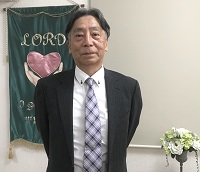↓Audio link to the sermon:(1st worship recording)
(If you can’t listen on your iPhone, please update your iOS)
1. There are two men who appear in this parable.
They came to the temple to pray just around the same time.
One man belonged to the group called “Pharisees” known as a religious group which is extremely fundamental and legalistic.
He thought very highly of himself as a “righteous man of faith”, and had an absolute confidence in his prayers.
However, faith is after all grace given by God and prayer is also mere means for intimate fellowship with God, wherein no one should have place for pride or sense of superiority.
This man who had pride and confidence in his faith and prayers constantly compared himself with others around him so he could feel good about himself by looking down on others.
The other man who also came to the temple was a tax collector.
At that time, tax collectors who worked for Roman Empire were disliked and disrespected by people as a “filthy betrayer”.
This tax collector went to the temple to pray, but he stood at a distance from the temple thinking that he was not qualified to approach there.
2. When the Pharisee saw the manner of this tax collector, he prayed to God in his heart as written in verse 11: “God, I thank you that I am not like other men – robbers, evildoers, adulterers – or even like this tax collector. I fast twice a week and give a tenth of all I get”.
So he was actually comparing himself with the tax collector who was even hesitating to go near the temple so he can brush up his pride, thinking, “how righteous I am comparing to the corrupt tax collector… I have never acted like evildoers and always have been faithful in offering and fasting as I was taught by my teachers.”
“Throughout my life I have always valued good manners, wisdom and rituals. My way of life can be displayed to the public without any shame. A man like me should be worthy of walking right beside God.”
On the other hand, the action the tax collector took is written in verse 13: “But the tax collector stood at a distance. He would not even look up to heaven, but beat his breast and said, “God, have mercy on me, a sinner””.
He looked back the way of his life by remembering each of wrongdoing in the past, and repented from bottom of his heart.
He was blaming himself and crying out in his heart, “what a fool! What a fool!”
Lord Jesus concluded this parable as written in verse 14: “this man (who was crying out, “Have mercy on me, a sinner” while beating his breast), rather than the other (who was acting a righteous man) went home justified before God.”
3. We ought to pay attention on the different words used for two men in this parable. The Pharisee “prayed about himself” and the tax collector “beat his breast and said”.
Jesus used the word “prayed” for the Pharisee and the word “said” for the tax collector. He was being sarcastic.
The prayer offered by the Pharisee was a good one. He first called out to God, which was the right thing to do.
Next, he offered thanksgiving to God. He received religious education, so he had enough knowledge that it was very important to give thanks to God in prayers.
However, if we pay close attention on the content of thanksgiving, we realize it was nothing but self-admiration regarding his religious life.
He was comparing himself with the tax collector so he could feel superior. He lived his life always comparing himself with others.
When you compare yourself with others, you feel either superior or inferior over/to them.
It seems though that this Pharisee had not realized how empty and meaningless it is to live your life that way.
He was good at using proper words in his prayers to impress people. He started out the prayer by crying out to God, which seemed right thing to do.
However, as you listen to his words, it sounds more like his self-advertisement rather than a prayer.
In other words, his faith was based on the desire to be recognized by others that he was “a good religious man”.
4. On the other hand, the words came out of the tax collector were too simple and miserable to even call a prayer. He only said, “God, have mercy on me, a sinner”.
Jesus used the word “said” regarding the tax collector’s prayer.
The tax collector did not strike any pose, nor looked up heaven when he said his prayer. He did not make any gesture or follow rituals to express his faith in God.
All he did was that he beat his breast and said, “God, have mercy on me, a sinner”. But these words were genuine cry came out from bottom of his heart. This is why Jesus used the word “said” instead of “prayed”.
This man’s cry poured out from his heart by regretting and repenting his sins was indeed a genuine prayer.
5. We have been pondering on contrasting inner attitude of two men who came to pray at the temple. It leads us to realize many points in the parable which make us repent our conduct and change our way of life.
However, I believe that the most important message of this parable is even beyond what we can learn from the inner attitude of two men. I think that the most important message in this parable can be learned from how God sees our inner attitude. He sees through our weakness deep down in our hearts and still loves us with his unchanging love.
I remembered an incident happened in Vienna, Austria when I visited there for the purpose of fellowshipping with the believers in Japanese Church and the business related to a music ministry.
I had a chance to carry a conversation with a Japanese tour guide/ interpreter who married an Austrian and lived there for a long time. She was not a believer at the time.
I asked her a question, “I understand that many refugees from Syria had immigrated here recently. How are things working out with them? Any changes in your lifestyle because of it?”
She answered to my question saying, “Oh it has been very scary around here. Number of Austrians were not happy with them”. Then she mumbled, “Because they are…”
I had to immediately confirm what she had said about the Syrian refugees so asked her, “What did you just say they are?”
She said, “Because they are all “toroi”.”
This word “toroi” which means dull and stupid is a dead word that people don’t even use any more in Japan.
When I heard this word from the mouth of a lady who lived in overseas for a long time, I had a very complexed feeling. She judged and looked down on all the refugees as dull and stupid.
I tried to comprehend the reality which people like this lady had to face daily. They live in a city where different tribes are mingled which can cause problems to which they feel uncontrollable fear and anger.
On the other hand, many of the refugees grew up in an awful environment watching people killing each other, without having a chance to learn the basic manners to carry a normal and orderly lifestyle.
They fled from their own country by walking hundreds of miles risking their lives.
It probably cannot be helped that people who cause difficulties and problems are called dull and stupid.
However, on the other hand, isn’t it another reality that everyone can become dull or fierce depending on the environment they are put under? No one can choose his/her parents, country to be in, or physical strength/weakness. We all have to accept what are given to us and live our lives accordingly.
There are many in this world who had no choice but to accept awful environment regarding their parents, country, or physical disabilities. Many of the children in this world do not have a chance to receive proper education.
What is your impression on those people who grew up in such harsh environment?
I believe that we must not look down on such people by boasting the fact that we were born and raised in a developed country.
Today’s parable was to admonish those who are confident in their righteousness before God and look down on others. Our Lord revealed through this parable the problem which nests deep in our hearts regarding prayers and faith.
When we read this parable, it is easy for us to focus our attention on the importance of humility and proper attitude in prayers — on our side.
However, I believe that we should focus our attention on God — how he sees us through and still loves us.
When we read this parable carefully, we can find two aspects in the way God sees us.
First, he sees through everything in our hearts with his keen eyes.
He sees and knows when we compare ourselves with others or judge faith of others.
Another aspect is that He sees us through when we realize our sins and mistakes. When we deeply regret our sins beating our breast, he sees the honesty with his kind and gentle eyes.
As we start a new week, let us remind ourselves that all of our thoughts and deeds are seen by God with his keen but kind eyes. May God help us to truly humble ourselves as we step forward the path prepared by Him, so we can see and treat others around us as gently and kindly as we can.
(If you can’t hear from the bar above, click the blue button)
iPhone




